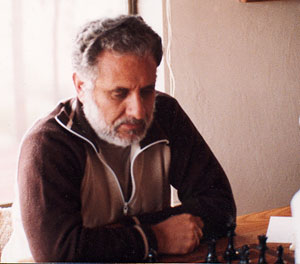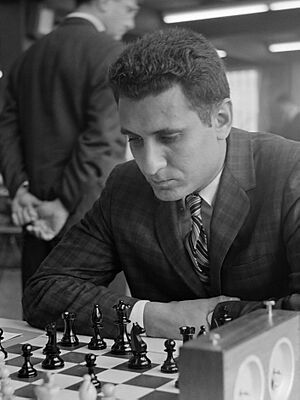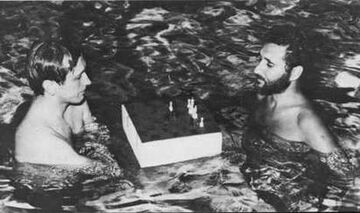Larry Evans (chess player) facts for kids
Quick facts for kids Larry Evans |
|
|---|---|
 |
|
| Full name | Larry Melvyn Evans |
| Country | United States |
| Born | March 22, 1932 New York, New York, U.S. |
| Died | November 15, 2010 (aged 78) Reno, Nevada, U.S. |
| Title | Grandmaster (1957) |
| Peak rating | 2631 (October 1978) |
| Peak ranking | No. 30 (January 1977) |
Larry Melvyn Evans (March 22, 1932 – November 15, 2010) was a famous American chess player. He was also a writer and journalist. In 1957, he earned the top chess title of Grandmaster. Larry Evans won the U.S. Chess Championship five times. He also won the U.S. Open Chess Championship four times. He wrote a popular chess column for many years. He also wrote or helped write over twenty books about chess.
Contents
Larry Evans's Chess Journey
Starting Out in Chess
Larry Evans was born in Manhattan, New York, on March 22, 1932. His family was Jewish. He learned a lot about chess by playing games for money on 42nd Street in New York City. He quickly became a rising star in the chess world.
At age 14, he placed well in the Marshall Chess Club championship. The next year, he won it all. This made him the youngest Marshall champion at that time. He also finished second in the U.S. Junior Championship. This led to an article about him in a chess magazine.
When he was 16, he played in the 1948 U.S. Chess Championship. This was his first time in this big event. In 1949, he tied for first place in the U.S. Junior Chess Championship. By age 18, he had won a New York State championship. He also won a gold medal at the Dubrovnik 1950 Chess Olympiad. His amazing score of eight wins and two draws tied for the best result there.
Becoming a U.S. Champion
In 1951, Evans won the U.S. Championship for the first time. He beat strong players like Samuel Reshevsky. He won his second championship the next year. He did this by winning a special match against Herman Steiner.
Larry Evans won the national championship three more times. These wins were in 1961–62, 1967–68, and 1980. In 1980, he tied for first place with Walter Browne and Larry Christiansen.
Earning the Grandmaster Title
FIDE, the world chess organization, gave Evans the title of International Master in 1952. Then, in 1957, he earned the highest title: International Grandmaster. In 1956, the U.S. State Department even named him a "chess ambassador." This meant he represented the U.S. through chess.
Evans played very well in many U.S. tournaments during the 1960s and 1970s. He won the U.S. Open Chess Championship in 1951, 1952, and 1954. He also tied for first in 1971. He won the first Lone Pine tournament in 1971.
Success at the Olympiads
Larry Evans played for the U.S. team in eight Chess Olympiads. These are big international team tournaments. He played over a period of twenty-six years. He won gold (1950), silver (1958), and bronze (1976) medals for his individual play. His teams also won gold (1976) and silver (1966) medals.
International Tournament Highlights
Evans also had good results in tournaments outside the U.S. He won the Canadian Open Chess Championship twice. These wins were in 1956 and 1966. He tied for first place in a tournament in Portugal in 1975. He also tied for second place with World Champion Tigran Petrosian in Venice in 1967.
At his best, in October 1968, his rating was 2631. This was a very high rating for a chess player.
Helping Bobby Fischer
Larry Evans never tried for the world championship title again after 1964. Instead, he focused on helping his fellow American, Bobby Fischer. Fischer was trying to become the world champion. Evans was Fischer's helper, called a second, for the matches leading up to the World Chess Championship 1972. This was the famous match against Boris Spassky. However, Evans did not help Fischer during the final championship match itself, after they had a disagreement.
Evans also wrote the introductions for Fischer's famous book, My 60 Memorable Games (1969). He encouraged Fischer to publish the book when Fischer was not sure about it.
Larry Evans's Chess Writing
Larry Evans was always interested in writing, not just playing chess. By age 18, he had already published two chess books. His book New Ideas in Chess came out in 1958. It was reprinted in 2011. He wrote or helped write more than twenty books about chess.
He wrote the tenth edition of an important book about chess openings called Modern Chess Openings (1965). He also wrote other books like Modern Chess Brilliancies (1970) and What's The Best Move (1973).
Evans started writing for chess magazines in the 1960s. He helped start the American Chess Quarterly. For over thirty years, he wrote a popular question-and-answer column for Chess Life. This is the official magazine of the United States Chess Federation (USCF). His weekly chess column, Evans on Chess, appeared in over fifty newspapers.
Evans also gave commentary on important chess matches for magazines like Time. He also appeared on TV shows like ABC's Wide World of Sports. He covered the famous 1972 match between Fischer and Spassky. He also covered other big matches in 1993 and 2000.
Larry Evans also added a lot of helpful lessons and content to the Chessmaster computer game series. He created an endgame quiz and explained classic chess games. In 1994, he was honored by being added to the U.S. Chess Hall of Fame.
Later Life and Passing
Larry Evans passed away on November 15, 2010, in Reno, Nevada. He died from problems after a gallbladder surgery.
Books by Larry Evans
- New Ideas in Chess (1958).
- Modern Chess Openings (1965).
- Chess Catechism (1970).
- Modern Chess Brilliancies (1970).
- Chess World Championship 1972 (1973) (with Ken Smith).
- Evans on Chess (1974).
- What's the Best Move? (1995).
- The 10 Most Common Chess Mistakes (1998).
- How Good Is Your Chess? (2004).
- This Crazy World of Chess (2007).
- Vienna 1922 (2011).
A Notable Chess Game
| This section uses algebraic notation to describe chess moves. |
This game was Larry Evans's first win against a well-known player. He played against Abe Yanofsky, who later became a grandmaster.
| h | g | f | e | d | c | b | a | ||
| 1 |

|
1 | |||||||
| 2 | 2 | ||||||||
| 3 | 3 | ||||||||
| 4 | 4 | ||||||||
| 5 | 5 | ||||||||
| 6 | 6 | ||||||||
| 7 | 7 | ||||||||
| 8 | 8 | ||||||||
| h | g | f | e | d | c | b | a | ||
- Daniel Yanofsky vs. Evans, U.S. Open 1947; Alekhine Defence
1.e4 Nf6 2.e5 Nd5 3.d4 d6 4.Nf3 Bg4 5.h3 Bxf3 6.Qxf3 dxe5 7.dxe5 e6 8.a3 Nc6 9.Bb5 Qd7 10.c4 Nde7 11.0-0 Qd4 12.Bg5 a6 13.Bxe7 axb5 14.Bxf8 Rxf8 15.cxb5 Nxe5 16.Qe2 0-0-0 17.Nc3 Ng6 18.Rad1 Qe5 19.Qc2 Rxd1 20.Rxd1 Rd8 21.Rc1 Nf4 22.Kh1 Qh5 24.Kh2 Rd3 25.f3 (see diagram) 25...Rxf3! 26.Rd1 Nxh3! 27.gxf3 Nf2+ 28.Kg3 Qh3+ 29.Kf4 Qh2+ 30.Ke3 0–1
In his book Modern Chess Brilliances, Evans shared four of his own best wins:
- Evans vs. Berger, 1964
- Evans vs. Blackstone, 1965
- Evans vs. Zuckerman, 1967 U.S. Championship
- Koehler vs. Evans, 1968 U.S. National Open
See also
 In Spanish: Larry Evans para niños
In Spanish: Larry Evans para niños
- List of Jewish chess players



